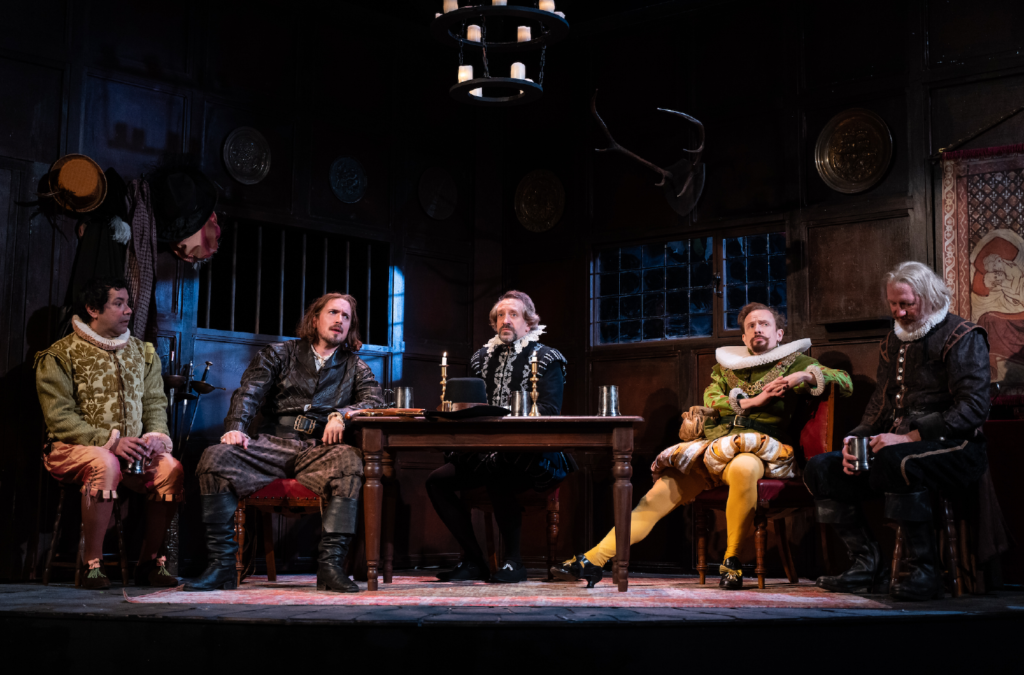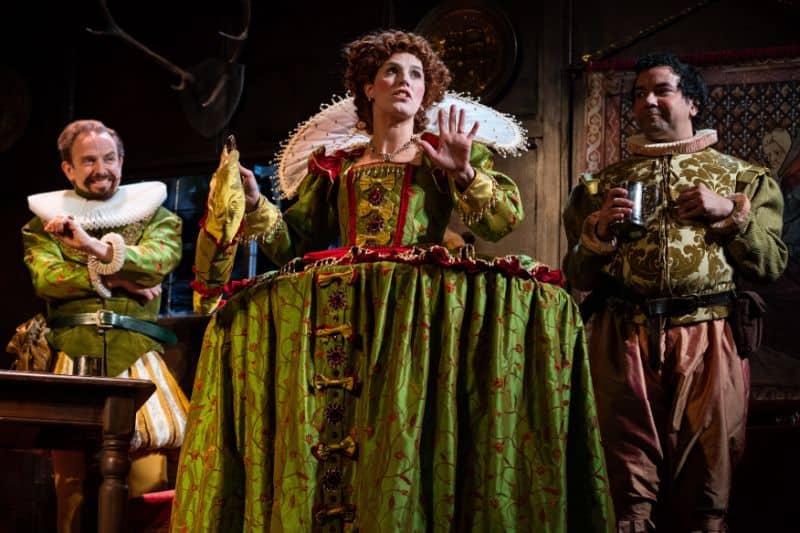
Guy Fawkes, Rumours and Rebels season, York Theatre Royal, until Saturday, 7.30pm nightly plus 2pm, Thursday and 2.30pm, Saturday. Box office: 01904 623568 or yorktheatreroyal.co.uk
FOR all the teeth-breaking toffee apples, pumpkin soup, fizzing fireworks and sausages – two forms of bangers, if you will – we take Guy Fawkes very seriously in York, more so than that scoundrel Dick Turpin. Born in this city, Christened at St Michael le Belfrey, no effigy burns on Bonfire Night at his old school, St Peter’s (likewise in Scotton, where Fawkes lived in his teenage years).
Yet just as he was mocked for his affected moniker Guido Fawkes, he is ridiculed for the ultimate incompetence of the Gunpowder Plot that ended with the treasonous traitor’s execution in January 1606, along with the hanging, drawing and quartering of his fellow conspirators. Cue comedic stereotyping of Popish knave Fawkes down the centuries.
Like the bungling incompetents in Guy Ritchie’s 1998 crime thriller Lock, Stock And Two Smoking Barrels, Fawkes’s story lends itself to black comedy, but like Vinnie Jones’s notorious line, “it’s been personal” for York-born writer and actor David Reed.
He first wrote a radio drama of Guy Fawkes for The Penny Dreadfuls, his troupe of purveyors of historical comedy spoofs, aired in 2009 on BBC Radio 4. Director Gemma Fairlie thought it should transfer to the stage, and rather later than first planned, it now forms Reed’s first stage play, billed as “an explosive new comedy”, one that takes the form of interlocking sketches more than a play in full flow, on Carla Goodman’s revolve set (to signify revolution).
Reed and Fairlie decided it should seek to weave together the two faces of theatre – comedy and tragedy – by combining high farce in the manner of Blackadder, Upstart Crow and Monty Python with the pathos of the futility-of-war finale to Blackadder Goes Forth, forever entrenched in the memory, like the poems of Owen and Sassoon. Thirty-six barrels of gunpowder? Seriously serious. One barrel of home brew among them. Comedy! The play seeks a more even balance, but ultimately to the detriment of both, never becoming a tragicomedy.
Lace in brief, witty bursts of metatheatre, referencing Shakespeare’s King Lear, the audience’s changing standards of theatre attire and a nod to Covid naysayers, dismissing the Plague as “a hoax”. Apply Horrible Histories’ flair for debunking history. Toss in a sword fight with The Three Musketeers panache. Crumbs, so much to play with, to squeeze in, so many elements to rub against each other, like sticks to start a fire. More of which later.
A pre-show chat with York actress Florence Poskitt, of musical comedy duo Fladam, and her father revealed he had once written a comedic musical version of Guy Fawkes. So many possibilities, and yes, this Guy Fawkes has music, of the incidental variety in the Jacobean style, by composer and sound designer Eamonn O’Dwyer.

The way it plays out, Reed’s Fawkes treacherous trigger man is the grave one, driven by the detremination to return Roman Catholicism to the throne by blowing up Westminster, haunted by seeing the pregnant Catholic martyr Margaret Clitherow compressed to death in York, struggling with post-traumatic stress disorder from years of fighting in Spain, and now hell-bent on death and destruction back home.
Whereas Rowan Atkinson’s Edmund Blackadder is a cynic, full of putdowns, Reed’s Fawkes is already too damaged to be a clown with a frown. Darkness to the light around him, let others do the historical mockery; he is a man on a mission, and Reed wants us to better understand his motives, to tell his side of the story, to highlight his tragic flaws, rather than merely decry him as a pantomime villain, just as the Richard III Society seeks to paint a fuller picture of another derided son of York, Richard III, to counter the slings and arrows of Shakespeare’s play.
Fawkes is the northern late arriviste to a bunch of southern-softie amateurs: revolutionary fops who gather regularly at their local to discuss and plot James I’s overthrow, keener on the snacks and the gossip than getting the job done under stressed-out, coffee bean-chewing ringleader Robert Catesby (a delightfully nuanced, dyspeptic comedic turn from Robin Simpson, continuing his run of superb autumn performances after a trio of roles in Harrogate Theatre’s H2 Rep season).
Broader comedy is to be mined in Greg Haiste’s blustering, preening Thomas Percy, aping Rik Mayall’s Lord Flashheart with chutzpah; Northern Broadsides favourite Andrew Pollard’s more melancholic, thwarted idealistThomas Winter (of discontent), donning a bear’s costume as a forlorn distraction, and Jamie Zubairi’s camp Kit Wright, still in thrall to Fawkes from York schooldays.
Guy Fawkes is two clashing plays within one, matched by the theatricality of Goodman’s costumes, with the gap being bridged by Cassie Vallance’s Martha Percy, Fawkes’s rekindled love from yore, who begins as a riff on Blackadder’s Queenie, but grows to match Fawkes’s political zeal. Their showdown is Reed’s best scene, one that shows the alternative direction that this play could have taken from the start, potentially far more combustible, more dramatic too, for being more troubled, like Fawkes himself.
Ironically, both in Reed’s script and Fairlie’s direction, the comedy is the play’s stronger suit, but as the plot thickens, the gunpowder never catches fire. Or rather, when it briefly does, symbolically it is stamped out.
Maybe the truth is Guy Fawkes could never be a tragic hero, such were his intentions, but when Reed’s Fawkes says at the close “God, I’m weird”, no-one laughs. In an out-and-out comedy, you would, but the line belongs in a wholly darker drama.
Review by Charles Hutchinson
